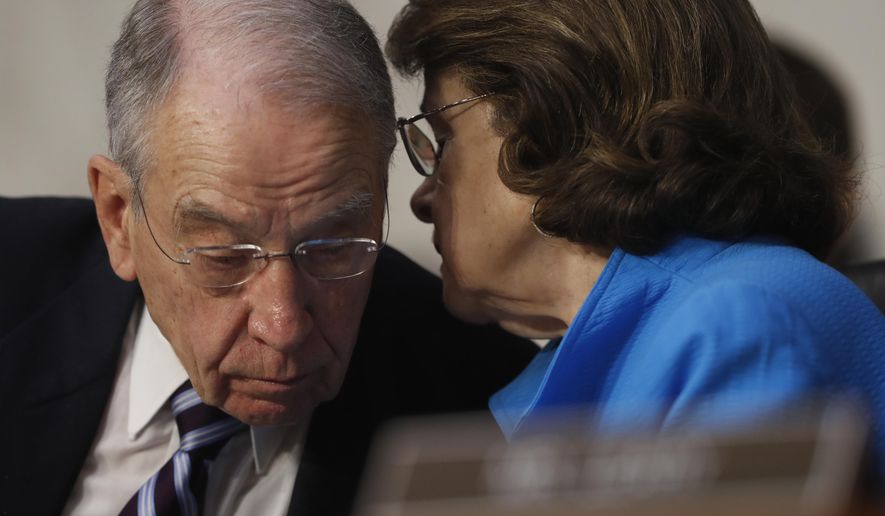Top senators said Thursday that people who smoked pot a couple of times in their lives shouldn’t be denied judgeships, saying it might soon become tough to fill the federal benches if marijuana use is considered disqualifying.
The attitude change came as the Senate Judiciary Committee debated judicial nominees and one senator said it seemed they were relaxing standards for President Trump’s nominees, compared to previous presidents’ picks.
Both Chairman Chuck Grassley and Sen. Dianne Feinstein, the ranking Democrat, said there’s been an evolving standard in society and the committee is adjusting to it.
“If that’s the sole judgment on whether somebody ought to have a judgeship or not — or maybe any other position — we may not be able to find people to fill those positions,” said Mr. Grassley, Iowa Republican, adding that his own views on drug use have changed since he came to Congress three decades ago.
None of the lawmakers said which nominee had spurred the reconsideration.
All of the president’s nominees are subject to background investigations by the FBI, and they’re required to disclose if they’ve ever used illegal drugs after the age of 18.
While there’s no formal rule for judicial picks, drug use had been used to oppose nominees in the past.
“Since the Clinton administration, Republicans on this committee have used the standard that any use of illegal drugs by a nominee after taking the bar exam are grounds to not clear the background information and prevent the nominee from advancing,” said Ms. Feinstein, California Democrat.
Sen. Richard Durbin, the Illinois Democrat who raised the issue, said Republicans prevented two judicial nominees — one during the Clinton administration, another during the Obama administration — from being confirmed based on their admission of marijuana use.
“I saw in those two instances how good people, because of a mistake they made in a young part of their lives, were disqualified for a lifetime federal service on the bench. I just think it was wrong,” Mr. Durbin said.
Sen. Patrick Leahy, Vermont Democrat, recalled during the George W. Bush administration, a key member of the Justice Department was involved in cocaine use.
“But the Republicans on the committee said, ’We really need him in the Department of Justice.’ He was confirmed,” Mr. Leahy said without identifying the Bush figure. “Let us make sure we are consistent.”
Marijuana use has snared major nominees quite publicly before. In 1987, President Ronald Reagan’s U.S. Supreme Court nominee Judge Douglas H. Ginsburg withdrew his nomination after controversy arose from him admitting to using the drug “on a few occasions” in the 1970s, including with his students while he was a professor at Harvard Law School.
“You like to think people who are appointed to the Supreme Court respect the law,” Mr. Grassley said at the time, according to The New York Times.
Tom Angell, chairman of Marijuana Majority, said it’s time to replace marijuana prohibition laws, adding that he was encouraged to see the senators acknowledge shifting public attitudes.
“Consuming cannabis should not be a barrier to employment for anyone unless it somehow impedes job performance. That’s especially true for marijuana use that occurred years or decades in the past,” said Mr. Angell. “But it’s also ridiculous that Feinstein and Grassley seem to think that using marijuana three times should prevent otherwise qualified nominees from being duly considered.”
• Alex Swoyer can be reached at aswoyer@washingtontimes.com.




Please read our comment policy before commenting.